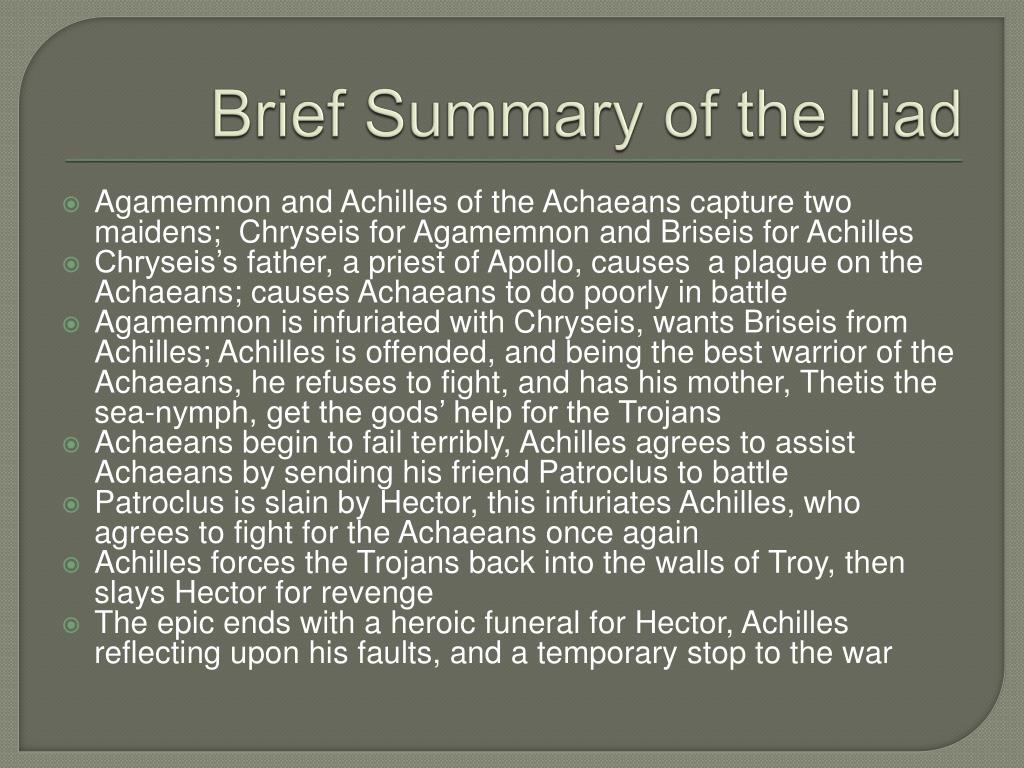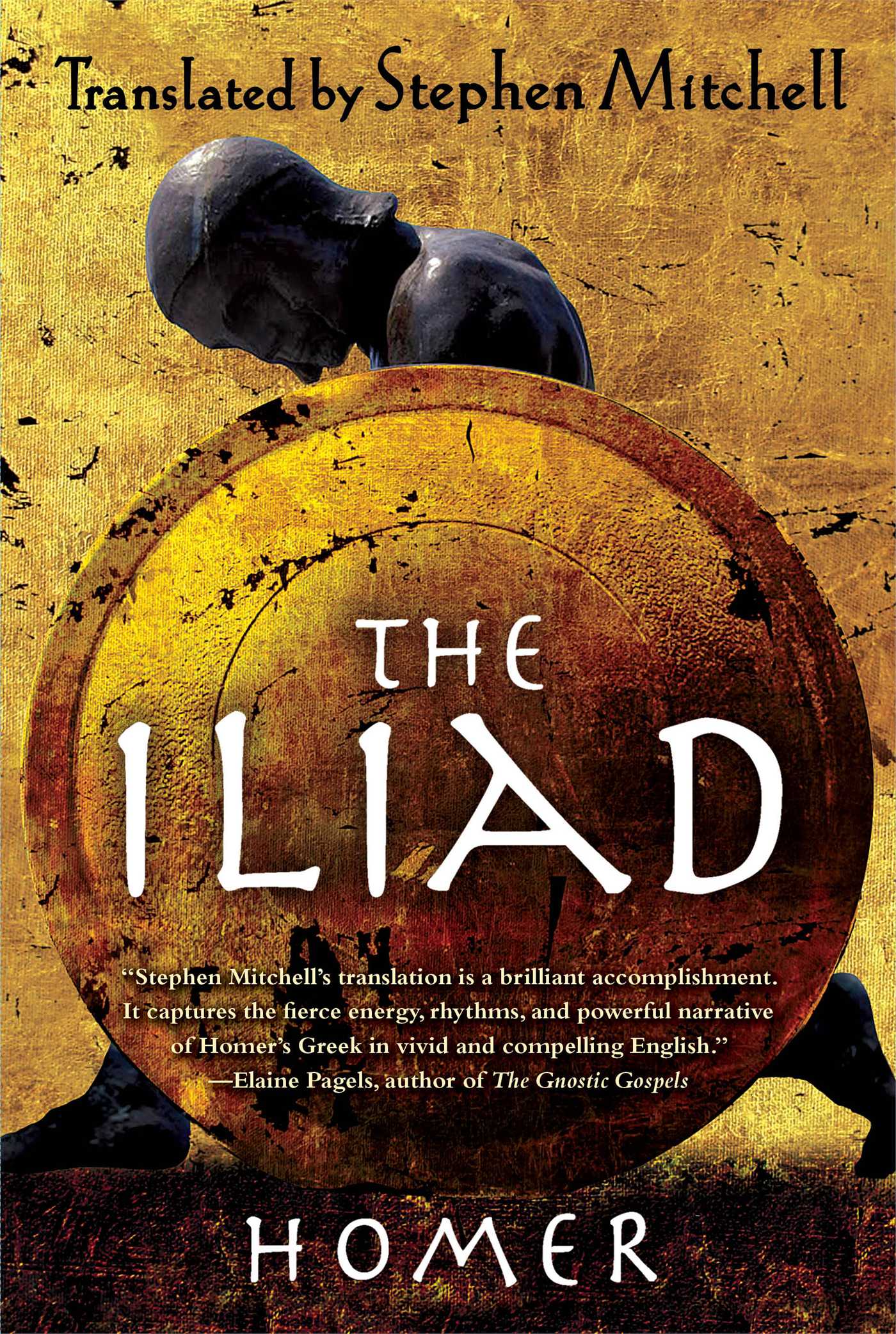The epic saga of the Trojan War, immortalised in Homer’s Iliad, reaches its heart-wrenching conclusion in Book 24. The battlefield has fallen silent, the clash of arms replaced by a poignant symphony of grief and reconciliation. This book, a stark contrast to the preceding battles, delves into the deepest emotions of humanity – sorrow, forgiveness, and the bittersweet acceptance of loss. Why is Book 24 so important? It serves as a powerful reminder that even in the midst of war’s devastation, acts of compassion and empathy can offer a glimmer of hope and pave the way for a fragile peace.

Image: www.slideserve.com
Book 24 unfolds against the backdrop of a heartbroken Priam, the King of Troy, who, defying the grief and rage that consumes him, embarks on a perilous journey to the Achaean camp. His purpose? To retrieve the body of his beloved son, Hector, slain in single combat by Achilles. Priam’s journey, a testament to his fatherly love, is a poignant reminder that even in the face of insurmountable loss, a parent’s love for their child remains unyielding.
Priam’s Journey: A Father’s Love Transcends War
Driven by a desperate yearning to see his son’s face one last time, Priam ventures into the Achaean camp, a place teeming with enemies, armed only with his humility and his unyielding love. His journey is not a march of war, but a pilgrimage of sorrow. He is accompanied by Hermes, the messenger of the gods, who grants him divine protection, ensuring his safe passage through the hostile terrain. This divine intervention underscores the depth of Priam’s grief and the recognition by the gods of the profound impact of his pain.
The meeting between Achilles and Priam is a turning point in the narrative. The scene is charged with raw emotion – the grief-stricken father, kneeling before the warrior who had taken his son, begging for the mercy of a dignified burial for Hector. Here, Achilles, a man known for his fierce wrath, demonstrates a surprising capacity for empathy. The sight of Priam’s brokenness, a vulnerability laid bare, evokes within Achilles the echo of his own grief for Patroclus, his closest friend and confidante. In this moment of shared human experience, a spark of reconciliation ignites, transcending the brutal divide of war.
The Weight of Grief: A Shared Human Experience
The scene unfolds with a powerful intimacy, the two men, bound by their shared pain and longing, engage in a dialogue that speaks to the universality of grief. Achilles, moved by Priam’s pleas, grants him permission to reclaim Hector’s body. He provides a temporary truce, suspending hostilities, for the sacred purpose of mourning and burial. The very act of granting this truce, a gesture of mercy offered by the victor to the vanquished, signifies a paradigm shift in the narrative, a subtle acknowledgement of the shared humanity that transcends the divisions of war.
The description of the truce is an exquisitely crafted passage, highlighting the profound impact of this act on both sides. It marks a much-needed respite from the relentless bloodshed, but more importantly, it symbolizes the fragile hope for a reconciliation. However, this hope is tinged with the bittersweet recognition of the losses endured, the wounds that are impossible to erase. The weight of the losses is subtly underscored, as the Achaeans and Trojans engage in a shared ritual of mourning, united in their grief for the fallen.
A Farewell to Arms: Hector’s Funeral, a Symbol of Closure
The funeral of Hector, the culmination of Book 24, is a monumental event, marking a symbolic closure to the narrative. The Trojans, led by Priam, perform elaborate funeral rites, meticulously crafting a pyre for their fallen prince. The scene is a testament to their love and respect for Hector, and a solemn reminder of his valor and sacrifice. The pyre, a symbol of hope and remembrance, is further emphasized through its visual descriptions – a blazing inferno of wood and flame, casting long shadows, a powerful visual representation of the intensity of their grief and the enduring memory of Hector’s heroism.
The final scene of the book sees the Achaeans and Trojans, defying the hostility of the past, come together in a joint ceremony. The united mourning marks a significant departure from the preceding battles, offering a glimpse of a potential future where peace may prevail. However, this fragile hope is tempered by the stark reality of the immense human cost of war. The book concludes with a symbolic gesture – the burial of Hector, a gesture that signifies not only a farewell to a fallen hero but also a farewell to the era of violent conflict.

Image: www.simonandschusterpublishing.com
Summary Of Book 24 Of The Iliad
Beyond the Battlefield: The Legacy of Book 24
Book 24, despite its poignant conclusion, offers a hopeful message. It emphasizes the power of human empathy and the possibility of reconciliation, even in the face of devastating loss. The journey of Priam, the unexpected compassion of Achilles, and the shared grief of all involved serve as powerful reminders of the shared humanity that transcends the brutal logic of war.
This book serves as a powerful commentary on the enduring tragedy and futility of war, showcasing its lasting effects on individuals, communities, and the very fabric of society. It’s a reminder that even in the darkest hours, a spark of humanity, a willingness to forgive and reconcile, can offer a glimmer of hope for a better future. The lingering question, however, remains – will humankind ever learn to embrace peace over conflict, to heal the wounds of war and forge a path towards lasting harmony?
This analysis of Book 24 of the Iliad serves as a springboard for further explorations. It encourages you to delve deeper into the rich tapestry of Homer’s epic, examining the complex themes of love, loss, grief, and the enduring power of human resilience. Consider how the events of this book have influenced both ancient and contemporary literature, art, and history. Most importantly, reflect on the lessons of Book 24, recognizing that the pursuit of empathy, forgiveness, and reconciliation remains a vital cornerstone for a more peaceful world.






